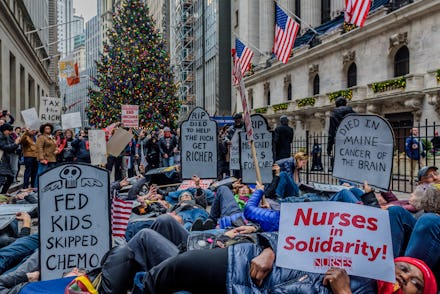50 million Americans have helped crowdfund health care. That's not a good thing

You've probably seen them: Those "feel good" local news stories about some plucky grade-schooler who raises thousands of dollars at their lemonade stand to help pay for a classmate's medical treatment. Doesn't it just make you feel all warm and squishy inside knowing those entrepreneurial kiddos are stepping up to help a friend in need? Or maybe it makes you absolutely furious that we live in a country where elementary school students are forced to pitch in to make sure their pals don't go bankrupt simply for trying to stay alive. Hopefully, you feel a little bit of both.
Here, then, is a truly staggering statistic: Nearly 50 million Americans have donated to some sort of crowdfunding effort to help pay off someone else's medical bills. That number, released Wednesday as part of a study by the National Opinion Research Center at the University of Chicago, represents some 20% of all Americans, and stands as a brutal indictment of just how thoroughly the American health care system has failed the population of the wealthiest country on Earth.
"As annual out-of-pocket costs continue to rise, more Americans are struggling to pay their medical bills, and millions are turning to their social networks and crowdfunding sites to fund medical treatments and pay medical bills,” NORC research scientist Mollie Hertel explained in a statement accompanying the study's release. "Although about a quarter of Americans report having sponsored or donated to a campaign, this share is likely to increase in the face of rising premiums and out-of-pocket costs."
Put another way: Health care in America is so expensive that 1 in 5 people have been compelled to help bail someone else out.
In fact, more than one-third of the time, the people on the receiving end of America's burgeoning crowdfunded health care economy are total strangers to those doing the donating, NORC's study concluded. And while that sort of anonymous generosity is certainly commendable, it's also entirely damning in light of just how out of control medical costs have gotten.
The study's release comes as questions about how to address America's onerous health care industry have dominated the Democratic presidential primary race. While some candidates like Joe Biden, the former vice president, and Minnesota Sen. Amy Klobuchar have pushed for incremental reform and adjustment to the existing system, others like Vermont Sen. Bernie Sanders have based their entire campaigns on a wholesale shift to Medicare-for-All. If nothing else, the disparate answers from the different candidates signal that there is at least unanimous agreement that the problem exists.
“It is clear that Americans want government and providers to work together to provide charity or assistance when needed,” NORC researcher Susan Cahn explained in the institute's press release. "Fewer Americans think that family, friends, or even strangers should shoulder the costs of care that patients and their families cannot afford."